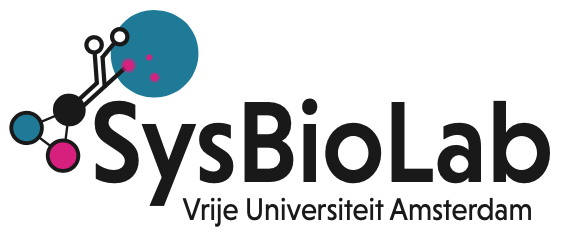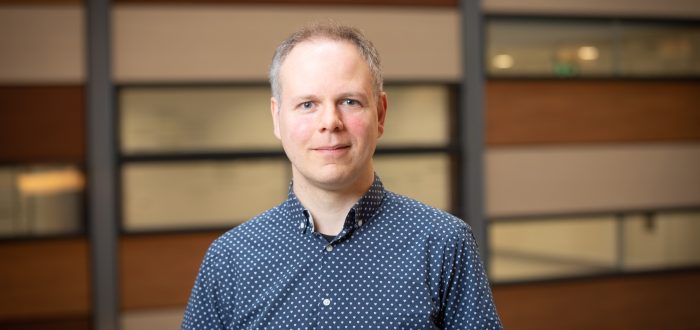From June 21-23, Frank is teaching a course at the TU Delft on enzyme kinetics and dynamic models of metabolism. The course information, e.g. the syllabus, can be found here Course information From Enzyme Kinetics to Models of Metabolism.
Lab News
PhD candidate Maarten Droste is one of the recipients of the famous Red Sock Award for best poster presentation at the SIAM 2023 Conference on Applications of Dynamical Systems in Portland, Oregon. It is a tradition that each prize winner receives a pair of red socks as part of the award. His winning poster, entitled “Determinants of optimal metabolic pathway choice by microorganisms”, is co-authored
After a few years break, finally it was again time for a lab outing. In the lovely setting of Berg en Dal, we enjoyed three days (April 19th-21st) of networking and conviviality. “Mens sana, in corpore sano” they say, so we stretched both our muscles, with plenty of biking, jeu de boules, ping pong and football, and
We combined our expertise in Gene expression regulation, Single-molecule RNA imaging, and Prokaryotic quantitative cell physiology to write a truly multidisciplinary review. It’s the product of a team effort by Alan Gerber (Amsterdam UMC), Sander van Otterdijk (Sysbio), Frank Bruggeman (Sysbio) and Evelina Tutucci (Sysbio). We discussed state-of-the-art imaging approaches for the measurement and quantitative
Pranas successfully defended his PhD thesis, titled “Constrain and conquer: explaining metabolic strategies of microbial life through optimal resource allocation” on March 20 2023. The promotors were Bas Teusink (VU Amsterdam) and Ursula Kummer (Heidelberg); Frank Bruggeman, Jack Pronk, Maria Suarez Diez, Peter Swain, and Meike Wortel were in the thesis committee. Pranas will stay
Together with Daan de Groot and Erik van Nimwegen, both in the Basel Biozentrum, and Age Tjalma, currently at AMOLF (Amsterdam), Frank was involved in a study on microbial phenotype switching which has recently been published in PNAS. Daan and Age previously worked in our lab. A fundamental limitation causes microbes to continuously struggle for
Jurgen Haanstra received a 750k€ grant in the ZonMw Open Competition together with Ruud Brakenhoff from Amsterdam UMC-Cancer Center Amsterdam (A-UMC-CCA). The ZonMw open competition funds research proposals for non-programmed, fundamental research. Through this, ZonMw wants to bring together researchers from two or more disciplines to facilitate excellent team science that results in groundbreaking research
Nitrogen limitation found as reason for lactate production Nitrogen composition determines the amount of lactate produced by yeast Lachancea thermotolerans in wine fermentations. Here we describe this phenomenon for the first time in the journal Food Microbiology. Knowledge about the role of nitrogen in the fermentation process of wine with yeast Lachancea thermotolerans may lead
After two years of online events, Pint of Science is back in your local pub! Pint22 will be hosting Science talks from May 9-11 and you will be able to enjoy mind-blowing scientific talks with a cold beer at your local bar in Amsterdam. The program of this year includes talks about laboratory meat, plant-based
We recently published a new paper, https://febs.onlinelibrary.wiley.com/doi/10.1111/febs.16401. Below you find a short reflection on this paper. Microbial behaviour has been shaped by evolution. Our understanding is that the best adapted genetic variants are outcompeting the others — which explains their frequency increase and their selection. These fit variants generate novel genetic variants, which perform even
Lab news
- Our take on the practical aspects of genome-scale modeling
- Our research featured in Quanta Magazine
- Herwig to lead €5M NWO Perspective Grant Consortium for plant-based fermentations
- We wrote a paper for a special issue celebrating the 50th anniversary of Metabolic Control Analysis
- New paper: Genome content predicts the metabolic preferences of bacteria
Recent Posts
- Our take on the practical aspects of genome-scale modeling
- Our research featured in Quanta Magazine
- Herwig to lead €5M NWO Perspective Grant Consortium for plant-based fermentations
- We wrote a paper for a special issue celebrating the 50th anniversary of Metabolic Control Analysis
- New paper: Genome content predicts the metabolic preferences of bacteria
Archives
- February 2024
- January 2024
- November 2023
- September 2023
- August 2023
- July 2023
- June 2023
- May 2023
- April 2023
- March 2023
- February 2023
- December 2022
- November 2022
- May 2022
- April 2022
- March 2022
- February 2022
- September 2021
- May 2021
- April 2021
- December 2020
- October 2020
- September 2020
- May 2020
- February 2020
- December 2019
- November 2019
- September 2019
- August 2019
- July 2019
- June 2019
- May 2019
- April 2019
- February 2019
- November 2018
- October 2018
- June 2018
- May 2018
- March 2018
- February 2018
- January 2018
- November 2017
- October 2017
- August 2017
- July 2017
- June 2017
- May 2017
- April 2017
- March 2017
- January 2017
- December 2016
- September 2016
- August 2016
- July 2016
- June 2016
- May 2016
- April 2016
- March 2016
- February 2016
- January 2016
- December 2015
- November 2015
- September 2015
- July 2015
- April 2015


Recent Comments